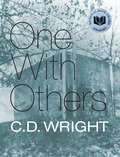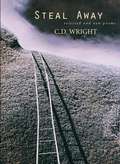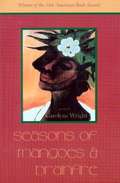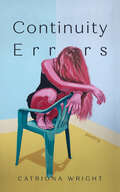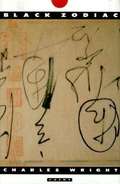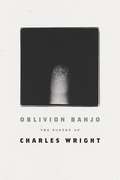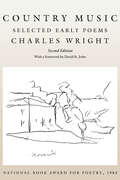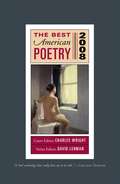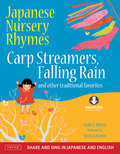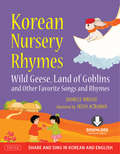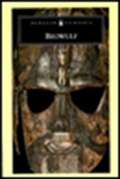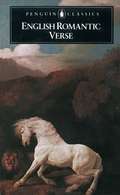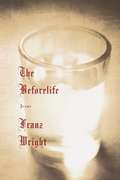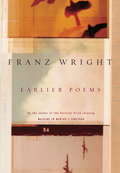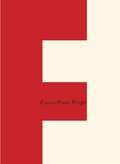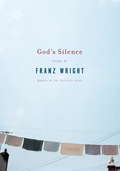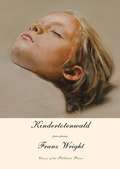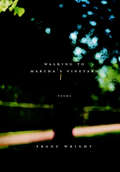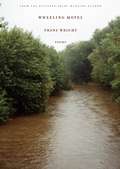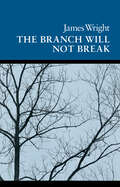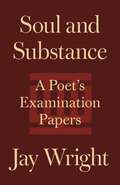- Table View
- List View
One With Others
by C. D. WrightHonored in "Best Books of the Year" listings from The New Yorker, National Public Radio, Library Journal, and The Huffington Post."One With Others represents Wright's most audacious experiment yet."-The New Yorker"[A] book . . . that defies description and discovers a powerful mode of its own."- National Public Radio"[A] searing dissection of hate crimes and their malignant legacy."-BooklistToday, Gentle Reader,the sermon once again: "SegregationAfter Death." Showers in the a.m.The threat they say is moving from the east.The sheriff's club says Not now. Notnokindofhow. Not never. The children'sminds say Never waver. Airfanned by a flock of hands in the oldfuneral home where the meetingswere called [because Mrs. Oliverowned it free and clear], andthat selfsame air, sanctifiedand doomed, rent with racism, andit percolates up from the soil itself . . . In this National Book Award finalist and National Book Critics Circle Award finalist, C.D. Wright returns to her native Arkansas and examines explosive incidents grounded in the Civil Rights Movement. In her signature style, Wright interweaves oral histories, hymns, lists, interviews, newspaper accounts, and personal memories-especially those of her incandescent mentor, Mrs. Vittitow-with the voices of witnesses, neighbors, police, and activists. This history leaps howling off the page.C.D. Wright has published over a dozen works of poetry and prose. Among her honors are the Griffin Poetry Prize and a MacArthur Fellowship. She teaches at Brown University and lives outside of Providence, Rhode Island.
Steal Away
by C. D. WrightNow in paperback, Steal Away presents C.D. Wright's best lyrics, narratives, prose poems, and odes with new "retablos" and a bracing vigil on incarceration. Long admired as a fearless poet writing authentically erotic verse, Wright--with her Southern accent and cinematic eye--couples strangeness with uncanny accuracy to create poems that "offer a once-and-for-all thing, opaque and revelatory, ceaselessly burning."from "Our Dust"You didn't know my weariness, error, incapacity,I was the poetof shadow work and towns with quarter-inchphone books, of failedroadside zoos. The poet of yard eggs andsharpening shops,jobs at the weapons plant and the Maybellinefactory on the penitentiary road."Wright has found a way to wed fragments of an iconic America to a luminously strange idiom, eerie as a tin whistle."--The New Yorker"Wright shrinks back from nothing."--Voice Literary Supplement"C.D. Wright is a devastating visionary. She writes in light. She sets language on fire."--American LettersC.D. Wright has published nine collections of poetry and earned many awards, including the Lannan Literary Award and a Guggenheim Fellowship. She teaches at Brown University and in 1994 was named State Poet of Rhode Island. With her husband, Forrest Gander, she edits Lost Roads Publishers.
Seasons of Mangoes and Brainfire
by Carolyne WrightSeasons of Mangoes and Brainfire recreates Carolyne Wright's time in Allende's Chile and on other travels through Latin America. It won the Blue Lynx Prize for Poetry, Oklahoma Book Award in Poetry, and American Book Award from the Before Columbus Foundation.
Continuity Errors
by Catriona WrightCBC BOOKS CANADIAN POETRY COLLECTIONS TO WATCH FOR IN SPRING 2023Feminist poems both serious and absurd that question our obsession with productivity instead of with care.Continuity Errors questions the privileging of work and productivity over rest and care from an ecological and feminist perspective. Written before and immediately after the birth of her first child, these poems try to imagine the future her son will inherit. Encounters with an unusual cast of characters – including lonely cryptids, unrepentant grifters, and persistent ghosts – provide incomplete answers, and while the continuity errors keep multiplying around her, Wright pauses to consider whether our devotion to innovation is keeping us stuck."Catriona Wright's Continuity Errors is a book of snaking moves and sneaking intellect, a book of style and fortitude and sass. Wright's always sharp and often eerie interrogations lead us through a world of cryptocurrency, grunt work, predictive policing, extinction, haute cuisine, billboard ads, smoke breaks, breast pumps; these are poems for our moment of onslaught and bewilderment that, having had the world forced down their throats, spit back." – Natalie Shapero, author of Popular Longing
Black Zodiac
by Charles WrightThese are poems suffused with spiritual longing, lyrical meditations on faith, religion, heritage, and morality that also explore aging and mortality with restless grace. Entering by way of small moments, Wright magnifies details to reveal a truth much larger than the quotidian happening that engendered it. <P><P> Pulitzer Prize Winner
Oblivion Banjo: The Poetry of Charles Wright
by Charles WrightThe selected works of one of our finest American poetsThe thread that dangles us between a dark and a darker dark, Is luminous, sure, but smooth sided. Don’t touch it here, and don’t touch it there. Don’t touch it, in fact, anywhere—Let it dangle and hold us hard, let it flash and swing.—from “Scar Tissue”Over the course of his work—more than twenty books in total—Charles Wright has built “one of the truly distinctive bodies of poetry created in the second half of the twentieth century” (David Young, Contemporary Poets). Oblivion Banjo, a capacious new selection spanning his decades-long career, showcases the central themes of Wright’s poetry: “language, landscape, and the idea of God.” No matter the precise subject of each poem, on display here is a vast and rich interior life, a mind wrestling with the tenuous relationship between the ways we describe the world and its reality.The recipient of almost every honor in poetry—the Pulitzer Prize, the National Book Award, and the Bollingen Prize, to name a few—and a former poet laureate of the United States, Wright is an essential voice in American letters. Oblivion Banjo is the perfect distillation of his inimitable career—for devout fans and newcomers alike.
Country Music: Selected Early Poems (Wesleyan Poetry Series)
by Charles Wright David St. JohnCountry Music is comprised of eighty-eight poems selected from Charles Wright's first four books published between 1970 and 1977. <P><P> From his first book, The Grave of the Right Hand, to the extraordinary China Trace, this selection of early works represents "Charles Wright's grand passions: his desire to reclaim and redeem a personal past, to make a reckoning with his present, and to conjure the terms by which we might face the future," writes David St. John in the forward. These poems, powerful and moving in their own right, lend richness and insight to Wright's recently collected later works. "In Country Music we see the same explosive imagery, the same dismantled and concentric (or parallel) narratives, the same resolutely spiritual concerns that have become so familiar to us in Wright's more recent poetry," writes St. John.<P> Co-winner of the 1983 National Book Award for Poetry
The Best American Poetry 2008: Series Editor David Lehman, Guest Editor Charles Wright
by Charles Wright David LehmanThe Best American Poetry series is a beloved mainstay of American poetry. This year's edition was edited by one of the most admired and acclaimed poets of his generation, Charles Wright. Known for his meditative and beautiful observations of landscape, change, and time,Wright brings his particular sensibility to this year's anthology, which contains an ecumenical slant that is unprecedented for the series. He has gathered an astonishing selection of work that includes new poems by Carolyn Forché, Jorie Graham, Louise Glück, Frank Bidart, Frederick Seidel, Patti Smith, and Kevin Young and showcases a dazzling array of rising stars like Joshua Beckman, Erica Dawson, and Alex Lemon. With captivating and revelatory notes from the poets on their works and sage and erudite introductory essays by Wright and series editor David Lehman, The Best American Poetry 2008 will be read, discussed, debated, and prized for years to come.
The Best American Poetry 2008
by Charles Wright David LehmanThe Best American Poetry series is a beloved mainstay of American poetry. This year's edition was edited by one of the most admired and acclaimed poets of his generation, Charles Wright. Known for his meditative and beautiful observations of landscape, change, and time,Wright brings his particular sensibility to this year's anthology, which contains an ecumenical slant that is unprecedented for the series. He has gathered an astonishing selection of work that includes new poems by Carolyn Forché, Jorie Graham, Louise Glück, Frank Bidart, Frederick Seidel, Patti Smith, and Kevin Young and showcases a dazzling array of rising stars like Joshua Beckman, Erica Dawson, and Alex Lemon. With captivating and revelatory notes from the poets on their works and sage and erudite introductory essays by Wright and series editor David Lehman, The Best American Poetry 2008 will be read, discussed, debated, and prized for years to come.
Japanese Nursery Rhymes
by Danielle Wright Helen Acraman2012 Creative Child Magazine Media of the Year Award Winner!What better way to learn a new language than through rhymes and music?Everywhere in the world, there are poems and songs especially for children--rhymes that are sung from generation to generation and never forgotten. In Japan, nursery rhymes speak of nature, of everyday joys and of Japan's own special culture. In Japanese Nursery Rhymes fifteen well-loved verses are colorfully presented in a format that makes language learning easier. The included audio CD features kids singing in both Japanese and English--songs so lively and sweet you'll find yourself singing along!For preschoolers and beyond, this book will be a joy to the mind, the eye, the ear and the heart.
Japanese Nursery Rhymes: Carp Streamers, Falling Rain and Other Traditional Favorites (Share and Sing in Japanese & English; includes Downloadable Audio)
by Danielle Wright Helen Acraman**2012 Creative Child Magazine Media of the Year Award Winner!**A delightful collection of fifteen well-loved rhymes, Japanese Nursery Rhymes is the perfect introduction to Japanese language and culture for young readers.What better way to learn the Japanese language than through rhymes and music. This beautifully illustrated multicultural book features songs and rhymes in both English and Japanese. Accompanied by an audio CD with recordings of kids singing in both languages - songs so fun and charming, it will be nearly impossible for you not to sing along!Favorite Japanese songs and rhymes include: My Hometown Bubbles The Rabbit Dance The Cradle Lullaby and many more!For preschoolers and beyond, this book will be a joy to the mind, the eye, the ear and the heart.
Korean Nursery Rhymes
by Danielle Wright Helen AcramanA charming collection of fourteen well-loved rhymes, Korean Nursery Rhymes is the perfect introduction to Korean language and culture for young readers.This beautifully illustrated book features songs and rhymes perfect for children who are interested in learning the Korean language or about its culture. Presented in both English and Korean, this multicultural children's book also includes an audio CD with recordings of kids singing in both languages -- songs so lively and sweet, you'll soon find yourself singing along! Many accompany everyday play activities like jum rope and hand clap games. Others speak to a child's view of nature, and a love of home.Favorite rhymes and songs include: Little One Monkey's Bottom Twirling Round Spring in My Hometown And more!For preschoolers and beyond, this book will be a joy to the mind, the eye, the ear and the heart.
Korean Nursery Rhymes: Wild Geese, Land Of Goblins And Other Favorite Songs And Rhymes [korean-english] [downloadable Mp3 Audio Included]
by Danielle Wright Helen AcramanA charming collection of fourteen well-loved rhymes, Korean Nursery Rhymes is the perfect introduction to Korean language and culture for young readers. This beautifully illustrated book features songs and rhymes perfect for children who are interested in learning the Korean language or about its culture. Presented in both English and Korean, this multicultural children's book also includes downloadable audio with recordings of kids singing in both languages -- songs so lively and sweet, you'll soon find yourself singing along! Many accompany everyday play activities like jum rope and hand clap games. Others speak to a child's view of nature, and a love of home. Favorite rhymes and songs include: Little One Monkey's Bottom Twirling Round Spring in My Hometown And more! For preschoolers and beyond, this book will be a joy to the mind, the eye, the ear and the heart.
Beowulf: A Prose Translation
by David WrightThe greatest surviving Old English poem rendered into modern prose Beowulf stands at the head of English literature; a poem of historical interest and epic scope. Although the first manuscript of Beowulf dates from around the year 1000 CE, it is thought that the poem existed in its present form from the year 850. Beowulf's adventures themselves stand in front of the wide historical canvas of 5th and 6th century Scandinavia. Against this heroic background of feuding and feasting, Beowulf first kills the monster Grendel and her mother, and later defends his people against a dragon in a battle that leaves them both mortally wounded. For more than seventy years, Penguin has been the leading publisher of classic literature in the English-speaking world. With more than 1,700 titles, Penguin Classics represents a global bookshelf of the best works throughout history and across genres and disciplines. Readers trust the series to provide authoritative texts enhanced by introductions and notes by distinguished scholars and contemporary authors, as well as up-to-date translations by award-winning translators.
English Romantic Verse
by David WrightEnglish Romantic poetry from its beginnings and its flowering to the first signs of its decadence. Nearly all the famous piéces de résistance will be found here - 'Intimations of Immortality', 'The Ancient Mariner', 'The Tyger', excerpts from 'Don Juan' - as well as some less familiar poems. As far as possible the poets are arranged in chronological order, and their poems in order of composition, beginning with eighteenth-century precursors such as Gray, Cowper, Burns and Chatterton. Naturally most space has been given over to the major Romantics - Blake, Wordsworth, Coleridge, Byron, Shelley, Clare and Keats - although their successors, poets such as Beddoes and Poe, are included too, as well as early poems by Tennyson and Browning. In an excellent introduction David Wright discusses the Romantics as a historical phenomenon, and points out their central ideals and themes.
The Beforelife
by Franz WrightIn this stunning collection, Franz Wright chronicles the journey back from a place of isolation and wordlessness. After a period when it seemed certain he would never write poetry again, he speaks with bracing clarity about the twilit world that lies between madness and sanity, addiction and recovery. Wright negotiates the precarious transition from illness to health in a state of skeptical rapture, discovering along the way the exhilaration of love--both divine and human--and finding that even the most battered consciousness can be good company. Whether he is writing about his regret for the abortion of a child, describing the mechanics of slander ("I can just hear them on the telephone and keening all their kissy little knives"), or composing an ironic ode to himself ("To a Blossoming Nut Case"), Wright's poems are exquisitely precise. Charles Simic has characterized him as a poetic miniaturist, whose "secret ambition is to write an epic on the inside of a matchbook cover. " Time and again, Wright turns on a dime in a few brief lines, exposing the dark comedy and poignancy of his heightened perception. Here is one of the poems from the collection: Description of Her Eyes Two teaspoonfuls, and my mind goes everyone can kiss my ass now-- then it's changed, I change my mind. Eyes so sad, and infinitely kind.
Earlier Poems
by Franz WrightThis collection is a rich study in one poet's development--not simply Wright's journey from dark to light, but a revelation of the ways in which the darkness contained glimmers of what was to come.
F: Poems
by Franz WrightIn these riveting poems, Wright declares, "I've said all that / I had to say. / In writing. / I signed my name. / It's death's move." As he considers his mortality, the poet finds a new elation and clarity on the page, handing over for our examination the flawed yet kneeling-in-gratitude self he has become. F stands both for Franz, the poet-speaker who represents all of us on our baffling lifelong journeys, and for the alphabet, the utility and sometimes brutality of our symbols. (It may be, he jokes grimly, his "grade in life.") From "Entries of the Cell," the long central poem that details the loneliness of the single soul, to short narrative prose poems and traditional lyrics, Wright revels in the compensatory power of language, observing the daytime headlights following a hearse, or the wind, "blessing one by one the unlighted buds of the backbent peach tree's unnoted return." He is at his best in this beautiful and startling collection.ent peach tree's unnoticed return." He is at his best in this beautiful and startling collection. From the Hardcover edition.
God's Silence
by Franz WrightIn this luminous new collection of poems, Franz Wright expands on the spiritual joy he found in his Pulitzer Prize-winningWalking to Martha’s Vineyard. Wright, whom we know as a poet of exquisite miniatures, opensGod’s Silencewith “East Boston, 1996,” a powerful long poem that looks back at the darker moments in the formation of his sensibility. He shares his private rules for bus riding (“No eye contact: the eyes of the terrified / terrify”), and recalls, among other experiences, his first encounter with a shotgun, as an eight-year-old boy (“In a clearing in the cornstalks . . . it was suggested / that I fire / on that muttering family of crows”). Throughout this volume, Wright continues his penetrating study of his own and our collective soul. He reaches a new level of acceptance as he intones the paradox “I have heard God’s silence like the sun,” and marvels at our presumptions: We speak of Heaven who have not yet accomplished even this, the holiness of things precisely as they are, and never will! Though Wright often seeks forgiveness in these poems, his black wit and self-deprecation are reliably present, and he delights in reminding us that “literature will lose, sunlight will win, don’t worry. ” But in this book, literature wins as well. God’s Silenceis a deeply felt celebration of what poetry (and its silences) can do for us. From the Hardcover edition.
Kindertotenwald
by Franz WrightA genre-bending collection of prose poems from Pulitzer Prize-winner Franz Wright brings us surreal tales of childhood, adolescence, and adult awareness, moving from the gorgeous to the shocking to a sense of peace. Wright's most intimate thoughts and images appear before us in dramatic and spectral short narratives: mesmerizing poems whose colloquial sound and rhythms announce a new path for this luminous and masterful poet. In these journeys, we hear the constant murmured "yes" of creation--"it will be packing its small suitcase soon; it will leave the keys dangling from the lock and set out at last," Wright tells us. He introduces us to the powerful presences in his world (the haiku master Basho, Nietzsche, St. Teresa of Avila, and especially his father, James Wright) as he explores the continually unfolding loss of childhood and the mixed blessings that follow it. Taken together, the pieces deliver the diary of a poet--"a fairly good egg in hot water," as he describes himself--who seeks to narrate his way through the dark wood of his title, following the crumbs of language. "Take everything," Wright suggests, "you can have it all back, but leave for a little the words, of all you gave the most mysteriously lasting." With a strong presence of the dramatic in every line, Kindertotenwald pulls us deep into this journey, where we too are lost and then found again with him.From the Hardcover edition.
Walking to Martha's Vineyard
by Franz WrightIn this radiant new collection, Franz Wright shares his regard for life in all its forms and his belief in the promise of blessing and renewal. As he watches the “Resurrection of the little apple tree outside / my window,” he shakes off his fear of mortality, concluding “what death . . . There is only / mine / or yours,– / but the world / will be filled with the living. ” In prayerlike poems he invokes the one “who spoke the world / into being” and celebrates a dazzling universe–snowflakes descending at nightfall, the intense yellow petals of the September sunflower, the planet adrift in a blizzard of stars, the simple mystery of loving other people. As Wright overcomes a natural tendency toward loneliness and isolation, he gives voice to his hope for “the only animal that commits suicide,” and, to our deep pleasure, he arrives at a place of gratitude that is grounded in the earth and its moods.
Wheeling Motel
by Franz WrightIn his tenth collection of poetry, Franz Wright gives us an exquisite book of reconciliation with the past and acceptance of what may come in the future. From his earliest years, he writes in "Will," he had "the gift of impermanence / so I would be ready, / accompanied / by a rage to prove them wrong / . . . and that I too was worthy of love." This rage comes coupled with the poet's own brand of love, what he calls "one / strange alone / heart's wish / to help all / hearts." Poetry is indeed Wright's help, and he delivers it to us with a wry sense of the daily in America: in his wonderfully local relationship to God (whom he encounters along with a catfish in the emerald shallows of Walden Pond); in the little West Virginia motel of the title poem, on the banks of the great Ohio River, where "Tammy Wynette's on the marquee" and he is visited by the figure of Walt Whitman, "examining the tear on a dead face."Here, in Wheeling Motel, Wright's poetry continues to surprise us with its frank appraisal of our soul, and with his own combustible loneliness and unstoppable joy.From the Hardcover edition.
Producing Women's Poetry, 1600-1730
by Gillian WrightProducing Women's Poetry is the first specialist study to consider English-language poetry by women across the seventeenth and early eighteenth centuries. Gillian Wright explores not only the forms and topics favoured by women, but also how their verse was enabled and shaped by their textual and biographical circumstances. She combines traditional literary and bibliographical approaches to address women's complex use of manuscript and print and their relationships with the male-generated genres of the traditional literary canon, as well as the role of agents such as scribes, publishers and editors in helping to determine how women's poetry was preserved, circulated and remembered. Wright focuses on key figures in the emerging canon of early modern women's writing, Anne Bradstreet, Katherine Philips and Anne Finch, alongside the work of lesser-known poets Anne Southwell and Mary Monck, to create a new and compelling account of early modern women's literary history.
The Branch Will Not Break: Poems (Wesleyan Poetry Program)
by James WrightA new poetry book from a Pulitzer Prize winning poet.
Soul and Substance: A Poet's Examination Papers
by Jay WrightA collection of new and startlingly original essays from an acclaimed poet, essayist, and playwrightJay Wright is widely recognized as one of the most important American poets of the past half century. But in recent years, he has also written a series of unconventional essays that he calls “examination papers,” which he defines as “designated inquiries to myself.” In these linked essays, most of which resemble prose-poems, with only a few lines set on each page, Wright explores abiding artistic and philosophical concerns, including language, aesthetic form, knowledge, time, and death. Soul and Substance presents these pieces for the first time.Drawing on everything from African mythology to mathematical axioms, Wright reflects on a wide range of topics: the difficulties of defining and confronting death; the challenge of transcending one’s own consciousness; the nature of rhythm and the structure of space; and the relationship among the self, the body, and the material world. Throughout, the book examines the limits of human knowledge and the implications of our always imperfect understanding.Experimental and original, Soul and Substance is an important addition to the work of a major writer.
